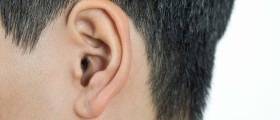
Congenital deafness is the term that refers to deafness present at birth. This type of deafness is different from acquired deafness and even though the two have different underlying causes, the outcome is the same, characterized by the inability of one to perceive sound.
Hearing Loss Classification
Medical professionals measure hearing loss in decibel loss (dB HL). There is the scale which classifies the severity of hearing loss. If there is 20-40 dB HL, a person is unable to hear whispers. Moderate hearing loss is when dB Hl is between 41 and 70. Such individuals cannot hear conversational speech. Severe hearing loss is in case of 71-95 dB HL when an individual cannot hear shouting. And finally, if there is > 95 dB HL, hearing loss is profound and the affected person simply cannot hear sounds which are normally painful for a healthy individuals.
Hearing loss can be also easily classified into conductive hearing loss, sensorineural hearing loss and the combination of the two. Conductive hearing loss is characterized by a failure of the sound waves to reach the inner ear from the outside. Sensorineural hearing loss, on the other hand, represents damage to the sensory cells and/or nerve fibers inside the inner ear.
Genetic Causes of Congenital Hearing Loss
It is estimated that bilateral hearing loss is more present than unilateral hearing loss. The condition is reported in 1.64 per 1,000 living births.
Genetic causes associated with hearing loss are divided into non-syndromic and syndromic.
Non-syndromic hearing loss is not associated with any other condition. It is reported in 80% of all cases and is most commonly connected with a mutation of the gene encoding for the connexin 26 molecule. In people with a positive family history, the illness is transmitted via autosomal dominant pattern.
Syndromic congenital hearing loss is associated with more than 100 syndromes. Some of these are Alport's syndrome, Branchio-oto-renal syndrome, X-linked Charcot-Marie-Tooth syndrome, Goldenhar syndrome, Jervell and Lange-Nielsen syndrome and many more.
Non-genetic Causes of Congenital Hearing Loss
Some children can be born without any genetic problem and still suffer from hearing loss. This is seen in babies who have developed Mondini dysplasia, enlarged vestibular aqueduct syndrome, as well as other malformations such as cleft palate, ossicular malformation, ossicular fixation, external auditory canal atresia or congenital cholesteatoma.
Congenital hearing loss may be also teratogenic i.e. develop due to intake of certain medications during pregnancy. Gentamicin and thalidomide have been shown to cause congenital hearing loss in babies whose mothers used these drugs during pregnancy.
Finally, if a mother has contracted some infections while being pregnant the risk of congenital hearing loss drastically increases. Infections of the mother associated with congenital hearing loss of her unborn baby include toxoplasmosis, HIV, syphilis, Rubella, Cytomegalovirus infection and Herpes virus infection.

















Your thoughts on this
Loading...